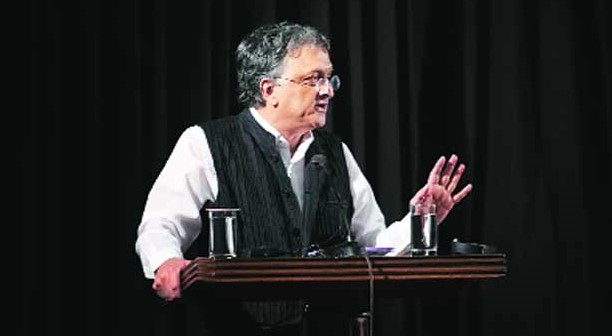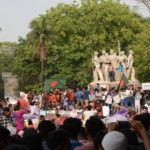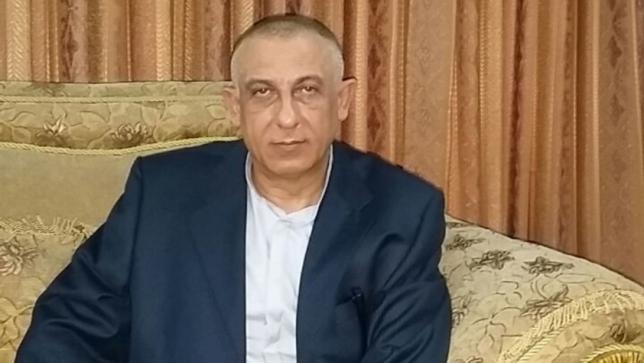Mr Ramachandra Guha talks about politics, secularism, history and other contemporary issues in an interview with Rezaul Karim Rony.
Ramachandra Guha (born 29 April, 1958, (Dehradun) is an historian and biographer based in Bangalore, India, who has taught at the universities of Yale and Stanford, held the Arné Naess chair at the University of Oslo, and been the Indo-American community visiting professor at the University of California at Berkeley.
His latest books are ‘Patriots and Partisans’ (Penguin) (2012) and ‘Gandhi before India’ (2013).
Between 1985 and 2000, he taught at various universities in India, Europe and North America, including the University of California, Berkeley, Yale University, Stanford University and at Oslo University. Ramachandra Guha defends the liberal centre against the dogmas of left and right, and does so with style, depth, and polemical verve. Guha displays a masterly touch, confirming his standing as Indian’s most admired historian and public intellectual. Guha attended the Dhaka lit fest for 1st time this year.
Let us start with your early memories or fascinations about Gandhi.
Ramachandra Guha: I didn’t have a lot at that time really. It was like growing up like a Bangladeshi youth reading about Bangabandhu Sheikh Mujibur Rahman as the father of the nation. But for me as an Indian, it was Mahatma Gandhi. We had many photos of Gandhi at home, Gandhi’s birthday was celebrated, etc, and nothing much really. It was like what every other Indian did. When I was a very young man, about 20 years old, I was becoming very serious about Gandhi. But later my attention, as a historian, turned towards Gandhi.
In or about 1980 when I was a young doctoral student in sociology, I had an argument with the philosopher Ramachandra (Ramu) Gandhi about his grandfather’s faith. I had always admired the Mahatma, but my secular-socialist self sought to rid him of the spiritual baggage which seemed unnecessary to his broad message. Could we not follow Gandhi in his empathy for poor and his insistence on non-violence while rejecting the religious idiom in which his ideas were cloaked? Ramu Gandhi argued that the attempt to secularise Gandhi was a mistake. If you take the Mahatma’s faith out of him, he told me, then Gandhi would not be the Mahatma. His religious beliefs were crucial to his political philosophy. In this respect, the man was the message.
What inspired you to write your book India after Gandhi?
Guha: Indian history had always been too much focused on the colonial period — the British Empire and the expansion, exploitation and the national movement. But the history of an independent India had been neglected. It was really a very fascinating experiment; there had always been turmoil, anxiety and conflicts in that new-born country. I wanted to try to understand my country and to tell the story of independence for a new generation, all its achievements and all its failures. Now I am preparing the 10th anniversary edition of this book. It will hit the market next year. It was an attempt to write a contemporary history.
In light of recent events, let me point out the ‘indigenised fascist’ tendency that is inherent in the Indian or Hindutva faith. What do you think of the recent cow politics and the role of Modi’s government in Gandhi’s India?
Guha: It was an unfortunate event. In a village just 50 kilometeres from New Delhi, a man was lynched by a mob claiming that he had eaten beef. The villager, a 50-year-old labourer, was a Muslim; the mob was made up of Hindus, whose religion deems the cow to be sacred.
At first, Narendra Modi did not respond at all, despite outrage going across the country and beyond. This was compounded when the minister in whose constituency the village fell, from the prime minister’s Hindu nationalist Bharatiya Janata Party, referred to the lynching as an ‘accident’.
Modi issued a tweet congratulating a billiards player on a tournament victory; and one offering condolences to a singer who had lost her son. But on the lynching of an ordinary Indian, there was silence. Finally, 10 days after the incident, he asked, in anodyne terms, for harmony. It was too little, too late.
This is a pattern that is becoming established in Modi’s premiership. Before the 2014 general elections, under pressure to distance himself from accusations of being linked to Hindu religious extremism, he focused on the pitch that he would govern as an economic moderniser. Yet economic reforms have lost momentum while social and religious division looks unchecked, at best.
Meanwhile, Modi’s party men were reviving the ‘Hindu first’ agenda. A BJP minister of state declared that non-Hindus were untrustworthy rascals. One BJP MP accused Muslim men of marrying Hindu women and converting them to Islam. Another demanded a mass campaign to ‘reconvert’ the Muslims and Christians to Hinduism.
Looking back, it appears that early on in Modi’s premiership, the RSS was testing the water. When statements by Hindu supremacists went unchecked, the group seemed to be emboldened. The cynical view would be that, deep down, Modi shared these views; the realist view, that he is perhaps too weak to override the RSS.
It may also be that he does not have the time. Since taking office last year, he has been to dozens of countries and is due in several more soon. While Modi is feted at state banquets as the leader of the world’s largest democracy, within India, sectarians are continuing their dirty work on the ground.
Making India more visible is important, so is garnering capital for infrastructure and industrial projects. Yet, economic revival can scarcely flourish amid conflict and uncertainty. Modi needs to speak out clearly for religious pluralism and social harmony — a view held by Gandhi as well — to reassure investors and, perhaps, more importantly, citizens of India as well.
I think 9/11 basically affects the Middle East, Europe and North America. It did not have much effect on India. Although India did face various kinds of attacks from time to time, they were not linked to 9/11.
So then, as a historian with a background in sociology, how would you describe this ongoing and increasing ‘Hindutavadi extremism’ in India? And what do you think about the growing claim of ‘secularism’ by the Indian politicians and liberal intellectuals?
Guha: As a historian I would rather not comment on current political activities. I talked about it in my book India after Gandhi. I called India an unnatural nation and an unlikely democracy. India is a very diverse, united, very poor and egalitarian country. How to create an atmosphere of tolerance and understanding? It is a long-term struggle. Every nation has such ups and down. This struggle for pluralism and democracy will continue; it is a painful and long struggle. The making of a country is a complicated process, such as that of India, Bangladesh, Pakistan, etc.
I don’t like the term ‘secularism’, its pluralism. In any multi-cultural and religious society, pluralism is important. Like in Bangladesh, here Muslims are the majority, Hindus are the minority and there is also a Buddhist minority — maintaining a pluralistic view is very important for Bangladesh. And India is not so different from Bangladesh in that sense. So, Gandhi’s teaching of harmony is very crucial for the present-day India and also relevant for Bangladesh as well as Pakistan and Sri Lanka. Gandhi fundamentally believed in religious harmony. Any person’s faith must be respected. There must be a faithful relationship and mutual understanding between people of all faiths and communities. There must be pluralism not only of religion but also of language. We must respect other people’s language and faith.
I was born in a home of liberally-minded Hindus. One could still be a Hindu and yet strongly oppose discrimination based on caste systems and the subjugation of women. One could be a Hindu and still be respectful of other faiths and traditions. That is what my reading of Gandhi has taught me.
The sociological background of the Hindutva hate can be partially reconstructed from the name and ideological background. Ideology is more directly manifested in their minds. This rests on a deep suspicion of and hostility towards those Indians who are not Hindus. Christians and especially Muslims come in for special animosity. The philosophy of Hindutva only mimics and reproduces the ideology of its major adversary. The extremist only recognises other extremists.
The Bangladesh-India relationship has been a big dilemma for a long time. In fact, most neighbouring countries are unhappy about India’s diplomatic role in the subcontinent. What is your view on the Bangladesh-India relationship?
Guha: It is one of the greatest weaknesses of Indian diplomacy that it has not been able to establish good relations with Nepal, Bangladesh and Sri Lanka. There is a hegemonic role of India as a big brother which Pakistan challenged and resisted; and there are genuine problems like the Kashmir conflict. This resistance, which has historical roots, ultimately turned violent a few times and we’ve seen that terrorism has been sponsored by Pakistan. But what’s wrong with Bangladesh, Nepal and Sri Lanka? There is no reason we shouldn’t have good relation with them. In fact, strong cultural ties are of great benefit to us and these nations. The biggest failure of India is not being able to establish understanding and trust between us.
In a recent lecture at New York University, you talked about India’s fault lines and the reasons why India should not become a super-power. Could you, please, elaborate?
Guha: There are many fault lines — social fault lines, gender fault lines, caste fault lines; upper caste-lower caste tension, tension between Hindus and Muslims, between the rich and the poor, the centre and provinces. I think there are many fault lines. And everybody should contribute to resolving these issues because in a sense, every society has fault lines. Academicians, thinkers, politicians and scholars must strive to identify these fault lines, ideally through non-violence and dialogues, and find possible solutions.
India may or may not become a super-power. This is simply a reckless and ambitious claim on part of the Indian government and others. It is the most unnatural nation with extraordinary diversity in religion, culture, language and ecology. As a nation, India is the largest democracy in human history and a largely illiterate country. If you follow recent Indian politics, you will see that our democracy is imperfect. So the claim remains very much optimistic.
After 9/11, we have seen the so-called ‘war on terror’ and militant insurgencies. How do you think these issues affected Indian politics as well as the sub-continental political atmosphere?
Guha: I think 9/11 basically affects the Middle East, Europe and North America. It did not have much effect on India. Although India did face various kinds of attacks from time to time, they were not linked to 9/11. I said in my last lecture (at the Dhaka Lit Fest) that one of the best things Manmohan Singh did after the Mumbai attack was that he did not retaliate against Pakistan. He did not make it a great propaganda even though the terror attack in Mumbai was planned by Pakistan. It is an important issue for India, as a large country, not to fight someone else’s war, Neither between America and China nor America and Russia. There was a policy of non-alignment. India also refused to join the cold war, unlike Pakistan, which joined the American bloc and China which joined the Soviet Block. I think this is very important to us to be of moderate influence and not to join any major power.
You are an established figure in cricket literature. In the 2015 World Cup, there was much controversy regarding the India-Bangladesh match. Bangladeshis were not happy and still Indian hegemony is present in the ICC. What is your view on the Indian cricket diplomacy?
Guha: See, I am not a nationalist. One of my favourite cricketers is Mushfikur Rahim. He is a wonderful batsman. I like his wicket keeping. My son also likes him, especially his fighting spirit and determination while chasing down a total. So cricket is a game you must really enjoy.
At that time, India’s role was quite unfortunate, on which I wrote a column. If you look at the history of cricket, firstly England was hegemonic, then it was Australia and now it is India. This hegemonic role is not uncommon, but certainly undesirable.
After the 1980s, the school of subaltern historiography emerged. It is now recognised globally and is also popular in Bangladesh. What are your observation and critiques of subaltern studies?
Guha: I do not want to take only a part of a society. I do not like to take sides. If you write, write for the whole society, top and bottom. My book, India after Gandhi takes both the bottom and the top of our society. But subaltern historiography talks about a narrow segment and yet it played a very important role. The criticism was that after some time, it had become too academic. It did not write on or reach a larger audience. Jargon and big words were used. It did play an important role at that time but history moves on. History has different faces. The 1980s subaltern studies were definitely significant but the weakness of subaltern history is that it never had a feminist history, except one or two issues, the one essay by Ranajit Guha about Chandra’s death.
You said that subaltern studies do not emphasise gender issues. But there are many works from the likes of Partha Chatterjee on gender issues. His work ‘The Nation and Its Women’ is part of A Subaltern Studies Reader: 1986–1995 (Oxford University Press, 2014), edited by Ranajit Guha, and it is quite definitive. He writes about the paradox of women’s issues, women’s issues in tradition, in nationalism and so on. Do you think your claim is valid?
Guha: No, not in subaltern studies. Only one man, Ranajit Guha, wrote about it. If you go through all of it, gender was very much neglected and so was the history of post-colonial India. They work on only the colonial period. Not the pre-colonial and post-colonial periods. But no school of history gives all the answers. So subaltern history is quite rich; but if you understand other dimensions such as environmental history, you will see that subaltern history never emphasises it. So I think that subaltern history is quite rich but beyond a certain point, it becomes a cult. Cults are not good. They only press themselves. But the group definitely played a very important role in the 1980s.
So subaltern history is quite rich; but if you understand other dimensions such as environmental history, you will see that subaltern history never emphasises it. So I think that subaltern history is quite rich but beyond a certain point, it becomes a cult. Cults are not good. They only press themselves. But the group definitely played a very important role in the 1980s.
You had your Environmentalism: A Global History published in 1999. As an environmental historian, tell us about the subcontinent’s current environmental situation.
Guha: We have our own environmental problem. In this case, it has nothing to do with imperialism. The environment has been polluted by us; so, we are at fault. We are causing rapid deforestation. It is we who are using chemicals to damage the soil. About 90 per cent of the environmental problems in Bangladesh, India and other parts of the subcontinent have been created by us. Our own people and our own governments are mainly responsible for this, because we do not have proper monitoring. We have corruption. It is a quite common tendency of South Asian people to blame foreigners. This is a mistake. Most of the problems are caused by us. Religious conflicts are caused by us and so are the environmental problems. I think that leftwing intellectuals usually blame foreigners for all our problems. I do not like such shameful acts. We create our own problems. We have to stop blaming the west. We have been independent for 75 years. We have to take responsibility for our own problems. So I think that the global environmental problems are caused by the west, but domestic environmental problems are caused by us.
Recently, many Indian writers and activists have returned their awards to protest against the growing intolerance in the political and cultural arena of India. You also received the Sahitya Academy Award and Padma Bhushan, but you have not returned them yet. Can we, please, know why you chose to not return the awards? And how would you evaluate the stand of those who did?
Guha: Well, I obviously respect the writers who returned their awards and I hope that they would also respect the decision of others who received awards, such as me, for not protesting by returning the awards. The award is given to me by a jury of writers in good faith. It was not given by the state or a political party. Even if I do not know members on the jury and the writers who had considered my theory and good work to be worthy of the awards as well as the works of so many other great people, we should respect their decisions and contributions to the rigorous award process. Despite the book being critical of Indira Gandhi and the RSS (Rashtriya Sayangsevak Sangha), I definitely appreciate the awards forIndia after Gandhi.
I regularly write columns for different magazines and newspapers where I express my opinions and critiques. I also have other forums to express my views. I respect the jury that had given me the awards. I have, thus decided not to return them.
Thank you for your time.
Guha: You are welcome. I have come here for the first time. I am really enjoying Dhaka and talking to you.













